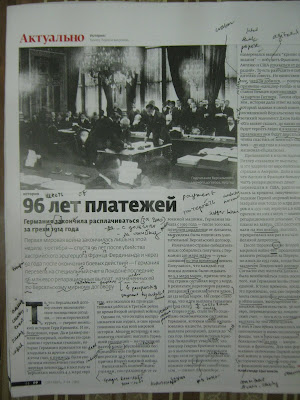
I have the burning urge to understand every word in the magazine.
The cover of weekly magazine "Russian Reporter", great stories and pictures.
How to say in Russian: Whatever that will not kill you will make you stronger.
How does it feel like being interviewed by your favourite magazine? It happened today. Two reporters from "Russian Reporter" (www.rusrep.ru) came to interview me. They are working on a special report about Kaliningrad. It took about 2 hours, and I shared my journey in their country and my encounters with Russian people. My dean Mr Vladimir Galiga recommended me to them and so we did the interview in my dormitory and we took pictures.
It touches delicately on issues about the destiny of Russia as a nation, how is it going to move forward. The magazine listens to the inner voices of intelligent and civic-conscious people who cares, loves and maybe loves-hates the country.
After I found it, I approached my teacher Irina Sergeevna, and she agreed we could pick up some articles and study them closely. The first issue I bought was titled "100 most influential people in Russia". It was a special report that zoomed into ten professional fields and their elites, and shared their views. They are from the legal, teaching, medical, journalism profession, there are also bureaucrats, social activists, artists, entrepreneurs among others. They did interview with one representative from each field. And reading them in Russian shows how different the way they express themselves because of the professional field they come from. Doctors are direct and straight-forward. The bureaucrat seemed to talk a lot but we understand little what he said. Sound familiar isn't it?
I must admit it is still difficult to fully understand the text but I tried hard to get as much as I can. With the help of my teacher, it helped a lot but I still feel a wall exists between me and the Russian text even I know already know every single word. I am sure it will become easier and easier!
And it gave me great happiness when I discovered what I long knew in English and Chinese when expressed in Russian. My favourite philosopher Nietzsche said, whatever that will not kill you will make you stronger. My eldest cousin-brother Kok Kee in UK first wrote to me when I was 15 in a letter. It seems to have become my motto in some ways. I saw it in the issue of Russian Reporter - Тo, чтo не убывает, делает нас сильнее. The reporters referred to the crisis of multi-culuralism model in Europe and how the development of the European society has overcame many crises in history. And hence, this crisis that is compounded by economic difficulties should be seen as a test, that European society must bite the bullet and overcome this crisis, like it did before.
What I also start to question is whether in Singapore we know who are the elites, and our notion of elite in our society and how they impact on the way the society is moving forward. As an individual how am I going to contribute to my own young country? We have a vibrant forum on the internet discussing everything that we don't in the mainstream media. Many people are seeing, thinking and writing, albeit on different platforms, I hope somehow this constitute great strength to shape and move our country forward.
My understanding of the Russian society is greatly helped by such publications. From my beloved prosperous little country to the biggest country on earth, it takes not only an air-ticket.






No comments:
Post a Comment